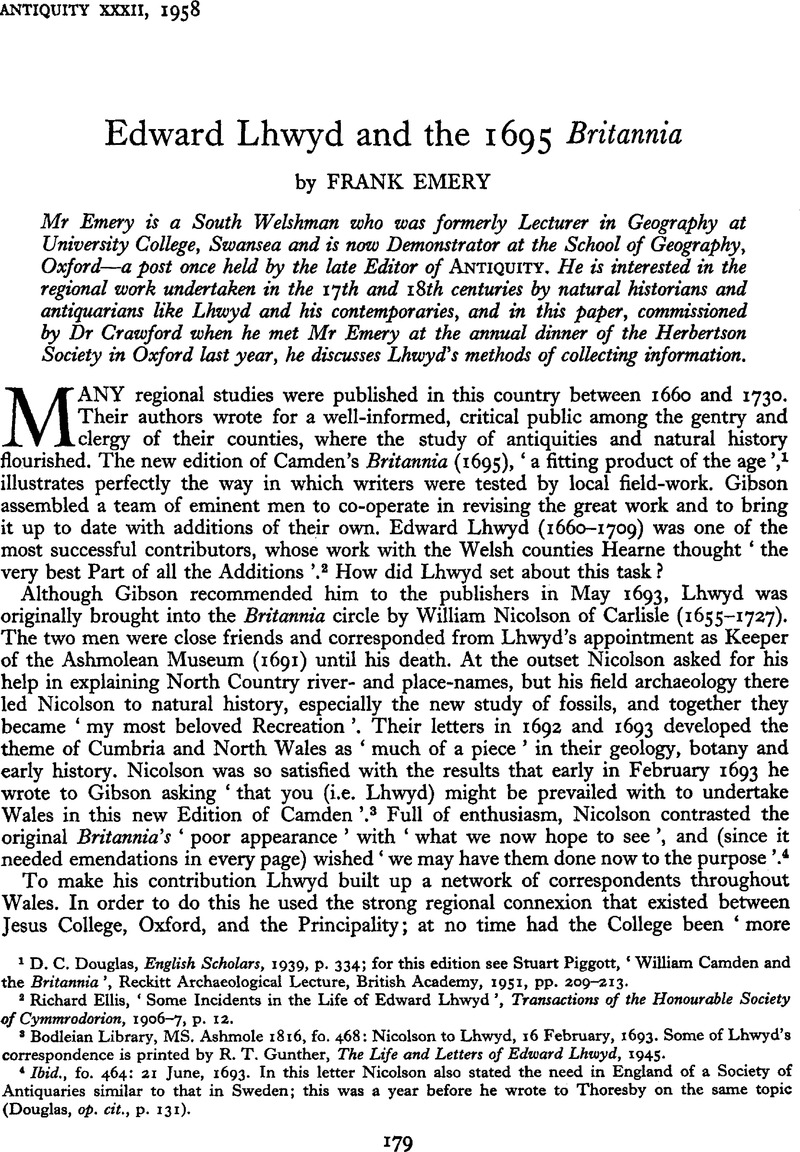Article contents
Edward Lhwyd and the 1695 Britannia
Published online by Cambridge University Press: 02 January 2015
Abstract

- Type
- Research Article
- Information
- Copyright
- Copyright © Antiquity Publications Ltd 1958
References
1 D. C. Douglas, English Scholars, 1939, p. 334; for this edition see Stuart Piggott, ‘William Camden and the Britannia’, Reckitt Archaeological Lecture, British Academy, 1931, pp. 209-213.
2 Richard Ellis, ‘Some Incidents in the Life of Edward Lhwyd’, Transactions of the Honourable Society of Cymmrodorion, 1906-7, p. 12.
3 Bodleian Library, MS. Ashmole 1816, fo. 468: Nicolson to Lhwyd, 16 February, 1693. Some of Lhwyd’s correspondence is printed by R. T. Gunther, The Life and Letters of Edward Lhviyd, 1945.
4 Ibid., fo. 464: 21 June, 1693. In this letter Nicolson also stated the need in England of a Society of Antiquaries similar to that in Sweden; this was a year before he wrote to Thoresby on the same topic (Douglas, op. cit., p. 131).
5 Ellis, art. cit., p. 3.
6 MS. Ashmole 1817a, fo. 307: to Lhwyd from Llanddewi Velfrey, 21 August, 1693.
7 This find is included in the list of ‘Roman Coin Hoards in Wales’, Bulletin of the Board of Celtic Studies, I, 1923, p. 352, where the reference is given as MS. Ashmole 1815 instead of 1817a.
8 MS. Ashmole 1817a, fo. 312: Roberts to Lhwyd, 11 December, 1693.
9 His proposals were published in November 1695, and can be read in Ellis, art. cit., pp. 13-15.
10 MS. Ashmole 1817a, fo. 316: 3 August, 1695.
11 Ibid., fo. 319: 9 .October, 1695.
12 The stone, with Latin and Ogam inscriptions and now back inside the Church, is listed by V. E. Nash- Williams, The Early Christian Monuments of Wales, 1950, p. 113. Lhwyd’s notes on sites or monuments are often invaluable evidence of their original plan or condition, e.g. his description of the stone circle at Llandyssilio, or the Paulinus stone from Cynwyl Gaeo (Carms.).
13 ‘A Roman Altar from Staward Pele’, Archaeologia Aeliana, XXVIII, 1950, p. 144; and on Nicolson’s Diaries, Trans. Cumberland and Westmorland Antiq. and Arch. Society, L (New Series), 1951, p. 112.
- 5
- Cited by


